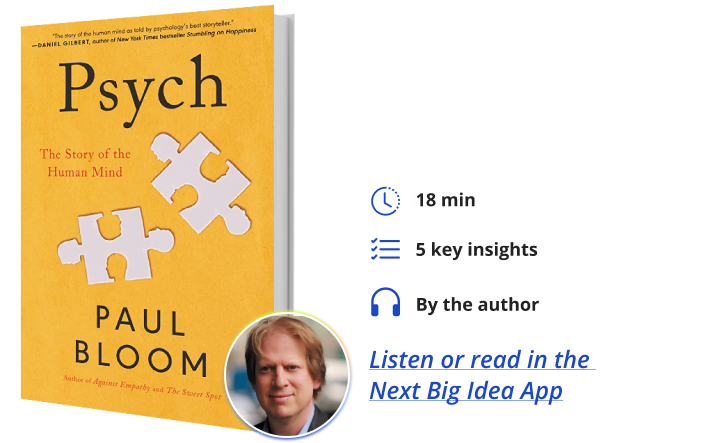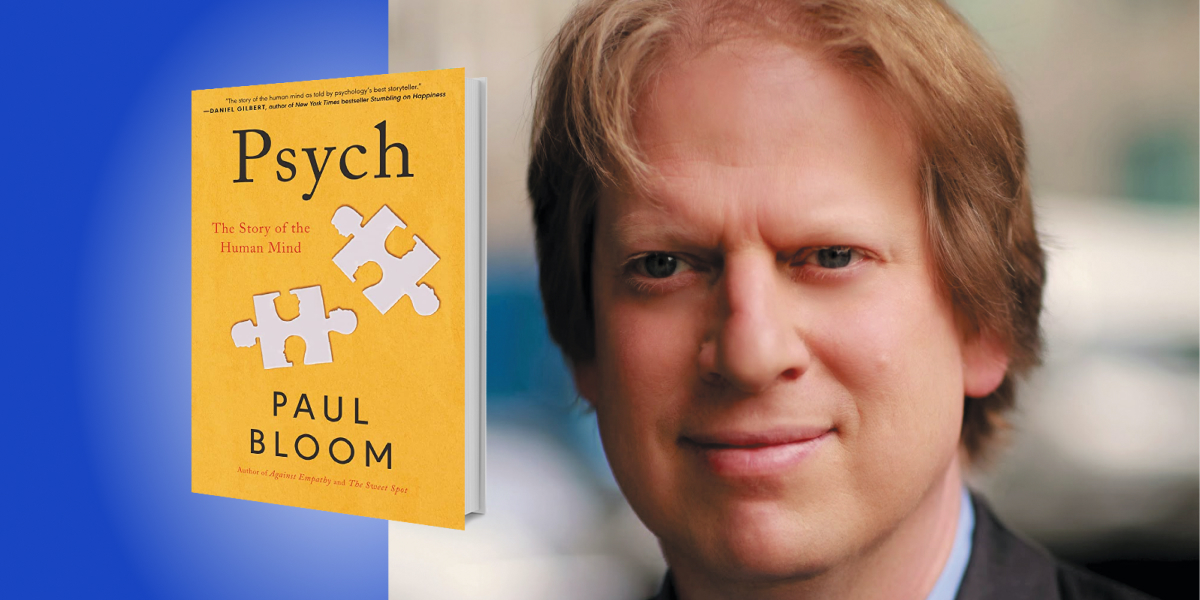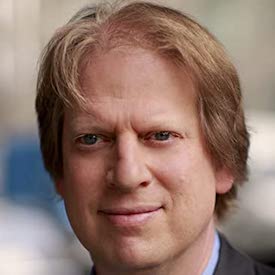Paul Bloom is a professor of psychology at the University of Toronto, and the Brooks and Suzanne Ragen Professor Emeritus of Psychology at Yale University.
Below, Paul shares 5 key insights from his new book, Psych: The Story of the Human Mind. Listen to the audio version—read by Paul himself—in the Next Big Idea App.

1. We are physical things.
Every aspect of thought, our most intimate beliefs, desires, and feelings, our consciousness and experience, are all the result of a very physical brain.
I know this sounds unnatural. There’s a lot of evidence that, intuitively, we’re common sense dualists. We feel like our minds are separate from our bodies. We are not identical to our bodies, rather we occupy them. Many religions assume that when you die, you could leave your body, you could survive the death of your body and ascend to heaven or descend to hell or occupy some spirit world. We’re comfortable with stories in fairy tales and science fiction where people switch bodies, where the soul leaves the body and occupies some other body. It feels right. But the science of psychology suggests that it’s actually mistaken. We are physical things. We are incredibly complicated physical things, but physical things, nonetheless.
The mind is the brain. This is an old idea, but with the methods of modern neuroscience, we can zoom in on it. We can use imaging mechanisms like fMRI to watch the brain at work while we think about different things. And we are not far from the point where you could watch a brain scan and be able to determine pretty specifically what somebody is thinking. We also know how damage to the brain can damage the most intimate and special aspects of ourselves, robbing us of our self-control, certain emotions, certain things that make us human.
Now, it’s helpful to know that we’re physical things, but it doesn’t change that much. After all, it’s not that we know how the brain gives rise to the mind. This is one of the deep mysteries of psychology, what the philosopher David Chalmers called “the hard problem of consciousness.” How can a physical lump of gray matter give rise to pain and pleasure, love and hate, and all of that? This is probably the hardest problem that there is.
“How can a physical lump of gray matter give rise to pain and pleasure, love and hate, and all of that?”
Now, when I tell people that the mind is the brain, there are different ways to react. I know philosophers and psychologists who confidently assert that this means that there’s no such thing as free will or moral responsibility. And I’ve met others who respond in the opposite way, who reject the science, worrying that this sort of physicalist approach to the mind, this materialism, takes a specialness away from people. It diminishes us somehow. It’s too reductionist. Too crude. It reduces us to computers or lumps of cells or lab rats. They reason: If psychology is going to tell me I’m just a machine, that the most intimate aspects of my being are nothing more than firings, well, so much for psychology!
I sympathize with both perspectives, but I don’t agree with either one. My view, which is what I argue throughout Pysch, is that we can find a middle ground. I think in fact that the scientific perspective at the core of modern psychology is fully compatible with the existence of choice and morality and responsibility. In a sense, we can have it all.
2. The dynamic unconscious.
This insight wasn’t originated by Freud, but Freud championed it more than anybody else. I talk a lot about Freud in the book, despite the fact that psychologists these days don’t think much of him and don’t take him that seriously. And there are good reasons for this. The man himself was a complicated character. One biographer, Frederick Cruz, describes him as a “liar, cheat, incestuous child molester, woman-hater, money worshiper, chronic plagiarizer, and all-around nasty nut job.” Many of Freud’s ideas were quite off the wall. He insisted on the importance of penis envy (the trauma when a girl discovers she lacks a penis) and castration anxiety (a boy’s concern that he’s going to lose his testicles). He believed the effect on a child if the mother dies and a father raises him is homosexuality due to exaggerated castration anxiety.
In general, few of Freud’s specific claims about the causes and cures of mental illness are taken seriously by clinicians. His developmental stage theory, including the famous Oedipal Complex, is properly rejected by developmental psychologists. But I think his best idea had staying power, and this is the notion of an unconscious mind that’s at war with itself.
Suppose you decide to get married and someone asks, “Why?” You might say, “Well I’m ready to get hitched. This is the right time of my life. I really love this person. I don’t want to live without them.” A Freudian might insist that you’re wrong. Maybe you really want to marry John because he reminds you of your father, or you really want to marry Laura to get back at your mother for betraying you, or some other bizarre reason. Now, if somebody told you these things, your response would be angry denial. But this wouldn’t deter a Freudian because a Freudian might think he or she knows you better than you know yourself. In fact, a Freudian might think that your anger is evidence that these theories are on the right track.
This is an extreme example, but there are simpler, more plausible cases of how we seem to be influenced by forces outside of our conscious awareness. Have you ever had a powerful attraction to a person, or a powerful dislike, but didn’t know why? Have you ever forgotten someone’s name at exactly the wrong time? Have you ever missed an important appointment even though you seemingly had every intention of being there? The unconscious, according to Freud, bleeds out into all of everyday life, showing up among dreams and jokes, speech errors, decisions, and so on.
“There’s abundant evidence that most of our cognition lies beneath the surface, that we have no direct access to the source of many of our feelings, emotions, and desires.”
The specifics of Freud’s theory of the unconscious are controversial and many of his claims have been challenged. A lot of psychologists, including myself, think he underestimated the human power for conscious deliberation. But he was right to insist on the centrality of processes of which we’re unaware. This has been supported by contemporary research and cognitive psychology, social psychology, and neuroscience. There’s abundant evidence that most of our cognition lies beneath the surface, that we have no direct access to the source of many of our feelings, emotions, and desires. Freud was wrong about so many things, but he was right about what matters the most.
3. Learning from babies.
Common sense tells us that babies don’t know very much. Jean-Jacques Rousseau put it in colorful terms. If a child were born in an adult body, he wrote, that child would be “a perfect idiot.” The classic metaphor from philosophers, particularly from John Locke, is that the mind is a blank slate. But metaphors change. A more modern way of putting it is that the baby’s mind is like an iPhone without any apps.
But there’s another view. This view is nativism, which proposes that much of our knowledge and capacities are part of our natural endowment. Let’s go back to the iPhone analogy. When you buy a new iPhone, it comes with several apps, some pre-installed contacts, maps, a dictionary, and so on. Nativism is the view that our brains are just like that. Early philosophers like Plato explained the existence of innate ideas as a result of souls recollecting knowledge learned in past lives. Modern-day nativists, like me, think of this as a product of an evolutionary history encoded in our genes.
Now, there has long been a debate about this, but only recently have we developed the methods to test whether or not babies have this knowledge. Most of our studies are done looking at babies’ eye movements, what they prefer to look at, how long they look, and so on. The idea is that babies, like owls, look longer at what surprises them. And if you monitor their looking time at different scenes, you could then infer what they expect and what they know.
I want to give you two concrete examples of studies that have really blown our minds and changed how we think about babies. The first goes like this. There’s an empty stage and the baby’s looking at it. A hand puts a single Mickey Mouse doll on the stage. Then a screen is placed in front of the doll that hides it from view. Next, the hand brings out another Mickey Mouse doll and places it out of sight behind the screen. Then the screen is removed. Now, as an adult, you know one Mickey plus another Mickey equals two Mickeys, so there should be two Mickeys on stage. Five-month-olds know this too, and they are surprised to find three Mickeys sitting there. This suggests that they can do rudimentary addition. It suggests that they know, contrary to what many people believed, that once an object goes behind a screen, it continues to exist. They have what psychologists call object persistence.
4. The surprising fragility of memory.
Some people think of the brain as akin to a video recorder. It has a perfect representation of experience and everything gets stored in it. We might sometimes forget things, but with the help of hypnosis, therapy, or just a lot of effort, we can get everything back.
One of the lessons of psychology is that this is mistaken. Sometimes what you experience, including what was once right in front of your face, gets lost forever. Sometimes it gets stored, but then it gets forgotten. Memories are encoded in brains, and brains are physical things and so they degrade over time. But, most importantly, remembering is a reconstructive event. It brings to bear your own experiences and expectations, and, as a result, your memories are a lot less trustworthy than you might think.
“We might sometimes forget things, but with the help of hypnosis, therapy, or just a lot of effort, we can get everything back.”
Some of the best research on this has been done by the psychologist Elizabeth Loftus. Her work looks at how leading questions can influence memory. In one study, she found that people are more likely to falsely remember there was a broken headlight when they had previously been asked, “Did you see the broken headlight?,” which presumes there was one, than when asked, “Did you see a broken headlight?,” which doesn’t make that presumption. In more dramatic studies, Loftus and her colleagues met with college students’ family members and got information about events from the students’ childhoods. The students were then reminded about these events and interviewed about their memories. The twist is that for each student, one of the events had never happened. It was made up by the researcher. Such events included being lost in a shopping mall, nearly drowning, spilling punch on a bride’s parents during a wedding, and being attacked by a vicious animal. In all of these cases, some of the subjects—not all—came to remember these false beliefs. They thought they had actually occurred.
This research has led to a revolution in the law. We now appreciate that police interrogations intended to tap into our memories can instead shape and correct them. And we see this in the real world. There are numerous cases where people have been put into prison and later exonerated through DNA evidence due to false eyewitness testimony shaped by these interrogations. There are even cases where people have come to believe falsely that they themselves have committed terrible crimes, even if there’s clear evidence that they were innocent. You could see now how this sort of psychological research can have a real practical influence on how we shape our policies and live our lives.
5. Happiness.
I want to end by sharing with you some of the discoveries from the field of psychology known as positive psychology.
Psychology has long been concerned with human suffering and human sadness, with the origin and treatment of diseases like anxiety, depression, and schizophrenia. Positive psychology looks at the bright side, at what goes into human happiness and pleasure, satisfaction, and flourishing. There have been large-scale studies, sometimes involving millions of people, and these have come up with some interesting, robust insights.
Some of them probably won’t surprise you. One is that money makes people happier. Within a country, rich people are happier than poor people. Across countries, citizens of rich countries are happier than citizens of poor countries. If anybody ever tells you that money has nothing to do with happiness, you can tell them that they’re wrong.
Social connections are also critical to happiness. People are happier when they are surrounded by people, by friends and family, by those who love and respect them. A recent paper in Science finds that being lonely has the same negative effect on us as smoking and obesity.
Here’s a third finding about happiness that may surprise you. The happiest time of your life may be when you’re in your seventies or eighties — or, if you’re lucky, your nineties. Researchers call this the U-shaped happiness curve. Our early years are relatively happy. There’s a drop in our mid-fifties; that’s when people are, on average, the least happy they’ll ever be. And then happiness rises again later in life.
To listen to the audio version read by author Paul Bloom, download the Next Big Idea App today:































